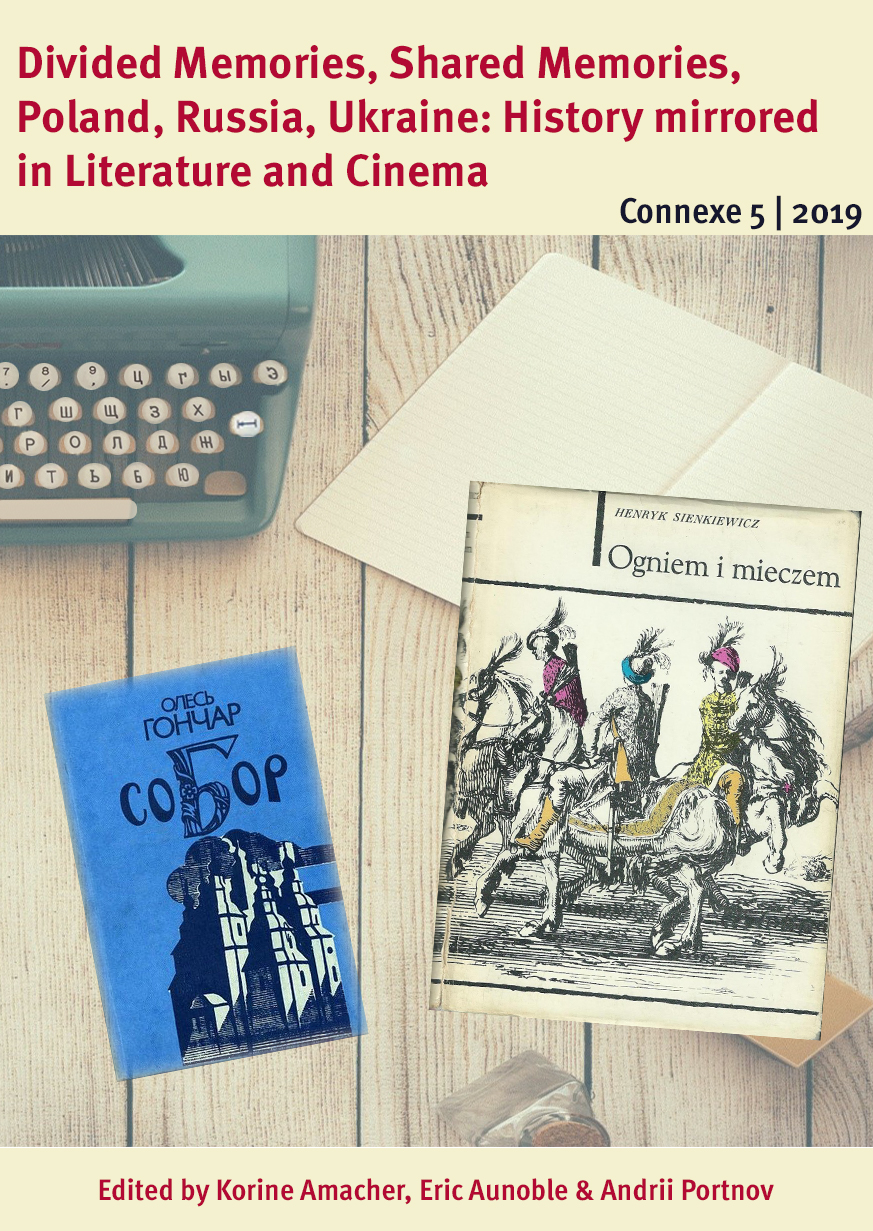Behind and Beyond Lenin and Dzerzhinskiy: Soviet-Polish Cooperation in Historical-Revolutionary Cinema (1960s–1980s)
DOI:
https://doi.org/10.5077/journals/connexe.2019.e254Keywords:
Movie-industry, Poland, USSR, Lenin, Dzerzhinskiy, 1960s–1980s, Sergey Yutkevich, Yevgeniy Gabrilovich, Yulian SemënovAbstract
Lenin and Dzerzhinskiy were the most promoted “divinities” in Soviet popular culture. The two leaders also had valuable characteristics for propagandising the “friendship of peoples” between the Soviet Union and the People’s Republic of Poland: Lenin had lived two years in the Krakow region whereas Polish revolutionary Dzerzhinskiy became a statesman in Soviet Russia. Between the 1960s and 1980s, Soviets and Poles coproduced three movies featuring Lenin and Dzerzhinskiy as transnational heroes: Lenin in Poland, by Sergey Yutkevich and Evgeniy Gabrilovich (1966), No Identification Marks (1979–1980) and Fiasco of Operation “Terror” (1981–1983) by Anatoliy Bobrovskiy and Yulian Semënov. The paper considers the interactions between Soviet and Polish professionals during the preparation, the shooting, and the release of these movies as examples of the “Statesocialist Mode of Production” and of its “micro-politics” (Szczepanik 2013). In the 1960s, Soviets and Poles officially got along well at the ideological level. Yet a muffled antagonism continued about the representation of their nation. In the late 1970s and early 1980s, revolutionary history about Dzezhinsiy was a mere setting for mainstream movies. Once political issues had been driven to the background, the professional advantage of joint movie productions became more obvious. Co-production offered professionals multiple opportunities: to enjoy tourism abroad, go shopping, improve skills by working with foreign colleagues and cutting-edge technologies. Although the involvement of some might have been motivated by personal interests, both countries ended up benefiting from the joint projects.
References
Aunoble, Éric. 2018. “La Pologne, un sujet soviétique? Représentations filmiques et trajectoires personnelles, 1939–1945.” Connexe 3 ‘Spoliations de guerre et transferts culturels : le cas du cinéma soviétique, 1939-1949’ : 79–111. https://doi.org/10.5077/journals/connexe.2017.e89
Badaev, A.E. 1932. Les bolcheviks au parlement tsariste. Paris: Bureau d’édition.
Blobaum, Robert. 1984. Feliks Dzierżyński and the SDKPiL. A Study of the Origins of Polish Communism. New York: Columbia University Press.
Elwood, Ralph C. 1977. Roman Malinovsky: A Life Without a Cause. Newtonville, MA: Oriental research partners.
Encyklopedia Puszcza-Bialowieska. 2008. “Igor Newerly.” http://www.encyklopedia.puszczabialowieska.eu/index.php?dzial=haslo&id=923
Gomulka, Stanislaw. 1978. “Growth and the Import of Technology: Poland 1971–1980.” Cambridge Journal of Economics 2: 1–16.
Gorsuch, Anne E. 2011. All This Is Your World: Soviet Tourism at Home and Abroad after Stalin. Oxford: Oxford University Press.
Khapaeva, Dina, and Nicolaï Kopossov. 1992. “Les demi-dieux de la mythologie soviétique. Étude sur les représentations collectives de l’histoire.” Annales. Economies, sociétés, civilisations 4–5: 963–987.
Kozovoï, Andreï. 2011. “Défier Hollywood: la diplomatie culturelle et le cinéma à l’ère Brejnev.” Relations internationales 147 (3): 59–71. https://doi.org/10.3917/ri.147.0059.
Krausz, Tamás. 2015. Reconstructing Lenin: An Intellectual Biography. New York: Monthly Review Press.
Lipovetsky, Mark. 2011. Charms of the Cynical Reason: Tricksters in Soviet and Post-Soviet Culture. Boston: Academic Studies Press.
Matuszewski, Ryszard. 1999. Literatura Polska 1939–1991, wyd. Trzecie. Warszawa: Wyd. Szkolne i Pedagogiczne.
Mituyrova, Ekaterina. 2019. “Les coproductions franco-soviétiques des années 1950–1970 : entre enjeux économiques et politiques.” In Mariages à l’européenne. Les coproductions cinématographiques intra-européennes depuis 1945, edited by Paola Palma and Valérie Pozner, 19–49. Paris: AFRHC.
Najdus, Walentyna. 1953. Lenin w Polsce. Warszawa: Książka i Wiedza.
Najdus, Walentyna. 1983. Polska Partia Socjalno-Demokratyczna Galicji i Śląska 1890–1919. Warszawa: Państwowe Wydawnictwo Naukowe.
Pisu, Stefano. 2019. “Les coproductions italo-soviétiques (1950–1970) : coopération réelle entre Est et Ouest ou occasion manquée?” In Mariages à l’européenne. Les coproductions cinématographiques intra-européennes depuis 1945, edited by Paola Palma and Valérie Pozner, 51–71. Paris: AFRHC.
Pozner, Valérie. 2019. Manuscript.
Prokhorov, Alexander, and Elena Prokhorova. 2017. Film and Television Genres of the Late Soviet Era. New York, London: Bloomsbury Publishing.
Rembacka, Katarzyna. 2013. “‘Dodatkowy dzień tygodnia’ Leonarda Borkowicza.” Polish Biographical Studies 1: 137–148.
Shaw, Tony, and Denise J. Youngblood. 2010. Cinematic Cold War: The American and Soviet Struggle for Hearts and Minds. Lawrence, KS: University Press of Kansas.
Siefert, Marsha. 2016. “Soviet Cinematic Internationalism and Socialist Film Making, 1955–1972.” In Socialist internationalism in the Cold War: Exploring the Second World, edited by Patryk Babiracki and Austin Jersild, 161–193. Basingstoke, UK: Palgrave Macmillan.
Skrzydło, Leszek. 1985. Среди друзьей, Wśród przyjaciół (on a screenplay by Aleksandr Aneychik; Сценарий А. Анейчика). Ленинград – Łódź: Леннаучфильм, Wytwórnia Filmów Oświatowych, 18mn 51s.
Sumpf, Alexandre. 2015. Révolutions russes au cinéma. Naissance d’une nation: URSS, 1917–1985. Paris: Armand Colin.
Szczepanik, Petr. 2013. “The State-socialist Mode of Production and the Political History of Production Culture.” In Behind the Screen: Inside European Production Cultures, edited by Petr Szczepanik and Patrick Vonderau, 113–133. New York: Palgrave Macmillan.
Szymczak, Damian. 2015. “1914–1920: Comment les Polonais retrouveront-ils leur indépendance?”. Guerres mondiales et conflits contemporains 260 (4): 33–58.
Woll, Josephine. 2000. Real images: Soviet cinemas and the Thaw. London: IB Tauris.
Березин, Владимир. 2016. “Цветочная улица – эссе.” Новый Мир 10. https://magazines.gorky.media/novyi_mi/2016/10/czvetochnaya-ulicza.html
Бернов, Ю.В., и А.Я. Манусевич. 1988. В Краковской эмиграции: Жизнь и деятельность В.И. Ленина в 1912–1914 гг. Москва: Политиздат.
Евграфов, Василий. 1960. Владимир Ильич Ленин. Биография (в соавторстве с П.Н. Поспеловым, В.Я. Зевиным, Л.Ф. Ильичевым и др.). Москва: Государственное издательство политической литературы.
Жизнь как кино. 2017. “Дмитрий Быков и Артём Сопин о фильме ‘Ленин в Польше.’” TV channel Первый Канал, 11 November 2017. https://youtu.be/JQF-lpVdbMM.
Казакевич, Еммануил. 1961. Синяя тетрадь. Повесть. Москва: Гослитиздат.
Логинов, Владлен. 1962. В. И. Ленин и “Правда” 1912–1914 годов. Москва: Госполитиздат.
Логинов, Владлен. 2005. Владимир Ленин. Выбор пути: Биография. Москва: Республика.
Логинов, Владлен. 2010. Неизвестный Ленин. Москва: Ексмо, Алгоритм.
Логинов, Владлен. 2017. Заветы Ильича. “Сим победиши.” Москва: Алгоритм.
Познер, Валери, Чернева Ирина, и Ванесса Вуазен. 2017. Пережить войну. Киноиндустрия в СССР, 1939–1949 годы. Москва: РОССПЕН.
Пумпянская, Седа. 1979. Краков помнит Ленина (Cracow remembers Lenin), по сценарию Константина Славина. Москва: ЦСДФ, 28mn.
Семенов, Юлиан. 1977. Горение: Роман-хроника. 1977 (кн. 1), 1979 (кн. 2), 1987 (кн. 3–4). Москва: Советский Писатель.
Суменов, Николай Мухтарбекович. 1982. Фильмы созданные друзьями. Серия Искусство 5/1982. Москва: Знание.
Юткевич, Сергей. 1991. Собрание сочинений, т. 2: Путь. Москва: Искусство.
Downloads
Published
How to Cite
Issue
Section
License
Some rights reserved 2020 Eric Aunoble

This work is licensed under a Creative Commons Attribution 4.0 International License.




